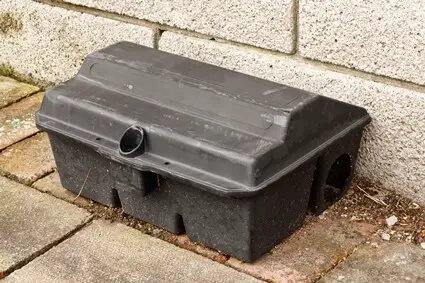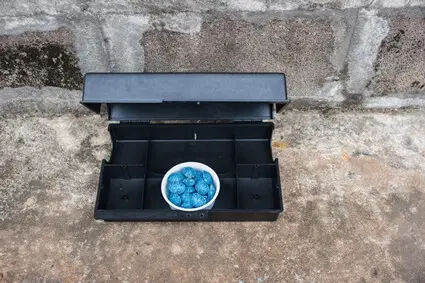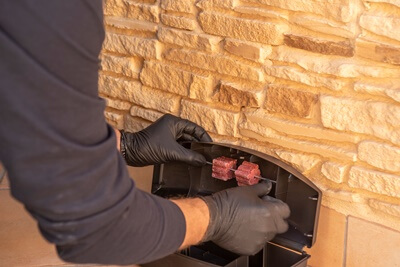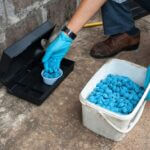For decades, we believed we had found an effective solution to rat infestations in the form of rodenticides, but the level of efficacy seems to be going down.
Rats have been developing a resistance to poison in recent years. Some rats have a genetic mutation, so some can withstand the effects of poison.
The rats that survive being poisoned due to this mutation pass on these genes to their offspring, resulting in widespread resistance to poison.
If you have a rat problem in your home, the same standard rodenticides won’t work. The traditional rat traps and poisons no longer kill rats, so you’ll need a different type of poison.
Can Rats Be Immune to Poison?
Rats can be immune to poison. This isn’t a new occurrence as, a few decades ago, scientists began noticing that rats were developing a resistance to common rodenticides. They noticed this phenomenon long before the general public noticed that rats were getting harder to kill.
Due to how rats gain their immunity, more rats grow resistant to poison. This has become more obvious as people realize that rodenticides don’t get rid of rat infestations like they used to.
Experts predict that rats will continue acquiring immunity, which doesn’t bode well for cities where rats are abundant, such as New York and Baltimore.
What Are Super Rats?
The term “super rats” refers to rats with immunity to common rodenticides.
In the west, many use this term to describe bigger and more aggressive rats than those typically seen a few decades ago. However, what makes a super rat has little to do with its size and behavior and more to do with its immunity.
The term became popular in 2012 after the publication of a report from the Rodenticide Resistance Action Group of the United Kingdom. The report mentioned that 70% of the rat population in England are immune to common rodenticides.
Since then, the general public has used the term to refer to larger-than-average rats, but researchers use the term when studying rat immunity to poison.

How Do Rats Become Immune to Poison?
Rats become immune to poison through natural selection.
Many people believe that rats can resist poison because they’ve altered their DNA after years of exposure. However, this isn’t the case.
It would take hundreds of years for rats to alter their DNA to make them fully resistant to poison. Anticoagulant rodenticides, which are the most commonly used, were invented in the 1940s. Within a few years, scientists noticed that some rats were resistant to the rodenticides.
Research began on the matter, but it was shortly discontinued. It wasn’t considered too much of a problem because many believed the immune rats were an anomaly.
However, researchers now understand that rats have always had a special genetic mutation that gives them immunity. While exposure to the poison does play a part, gene mutation plays an even bigger role.
Rodenticides are meant to deplete a rat’s supply of vitamin K until they bleed to death, but rats have polymorphisms in their vitamin K gene, so they aren’t affected.
The rats that have this genetic mutation are the ones that live long enough to have many offspring. The offspring that inherit the mutation survive longer than those that don’t, and the cycle continues until more than half the rat population living under your home are immune to poison.
Can Rats Survive Rat Poison?
Rats with the gene mutation that grants them poison immunity survive no matter how much poison you give them. Others die a few days after ingesting a small amount of poison.
Of course, biology isn’t always black and white, so rats can’t be divided into those that are immune and those that are not as cleanly as we would like.
Some rats don’t die immediately after ingesting poison, though they’re still affected. Their immunity might be strong enough to resist an immediate demise, but the poison might shorten the rat’s lifespan anyway.
It won’t die within 2-7 days (the average time for rodenticides to take effect), but it’ll suffer delayed effects later. This isn’t ideal, but there are ways to get rid of immune or semi-immune rats.
How Much Poison Can Kill a Rat?
If you buy a first-generation rodenticide, it may take a few feedings for the rat to die after 5-7 days. A second-generation rodenticide is more lethal, so the rat can die 2-4 days after a single feeding.
However, you shouldn’t count on the poison quantity if you want to eliminate rats.
There are lots of immune rats that aren’t affected by first or second-generation rodenticides. There comes a point where all you’re doing is leaving a snack for the rats to munch on at night.
Besides, 2-7 days is enough time for a male rat to procreate before dying. If the female rat has a healthy litter, your rat infestation will persist.

Which Poisons Are Rats Immune To?
Rats are mostly immune to anticoagulants like warfarin and chlorophacinone.
Anticoagulants prevent blood clots by thinning out the blood. Vitamin K is responsible for clotting blood, so rodenticides slowly kill off rats by depleting the vitamin K in their bodies until they bleed to death.
Recently, it has been discovered that rats are also immune to non-anticoagulants, although not biologically. According to Applied Animal Behavior Science, brown rats changed their behavior to avoid eating fatal doses of the poison.
They used calciferol, also known as vitamin D, and found 20-50% of the rats died. Females were more likely to survive than males, which explains why rats are hard to kill.
Will Rats Stop Eating Poison?
If the rats in your home aren’t eating the bait you set down, it could be because they’ve found a more enticing food source.
Aside from being immune to poison, some rats may not take the bait if more savory foods are available, such as cheese and peanut butter.
That’s why you must ensure that the rats have no access to other food sources. In this way, they have no choice but to eat the poison or take up residence in another house.
Rat Poison Keeps Disappearing
If rat poison keeps disappearing but the problem doesn’t seem to disappear, it could be because the rats are immune to poison.
If the rats are immune to the poison, they’ll eat it and won’t be affected. They don’t take it back to the nest since rats like to go out and eat away from their home.
If the rats aren’t the cause of the disappearing poison, another creature is. Cockroaches, squirrels, dogs, and other animals and insects could all be stealing the poison for themselves.







